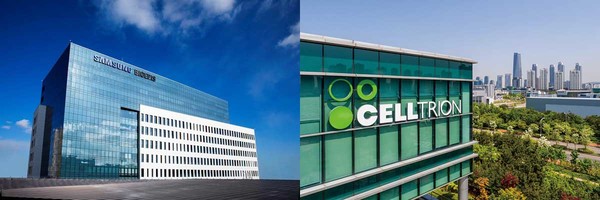Homegrown antibody biosimilar products are accelerating their penetration into the global market, as two makers -- Samsung Bioepis and Celltrion – have scored 11 approvals in Europe and eight in the U.S.

The achievement came eight years after Celltrion won the nod for Remsima (ingredient: infliximab), a therapy to treat autoimmune diseases, in Europe in 2013, market watchers said, adding that Korean biosimilar products released in global markets are expanding their presence gradually.
According to industry sources, Samsung Bioepis obtained sales approval for Byooviz, a Lucentis biosimilar, from the U.S. Food and Drug Administration on Wednesday, following its approval from the EU regulators in August. Lucentis is a treatment for eye diseases, such as macular degeneration, sold by Roche and Novartis. Last year, global sales for Lucentis amounted to about 4 trillion won ($3.3 billion), including 1.8 trillion won in the U.S. market.
Samsung Bioepis plans to sell Byooviz through a marketing partnership with Biogen in major global markets, including the U.S. and Europe.
With the approval of Byooviz, Samsung Bioepis has succeeded in obtaining sales approval for six biosimilars in Europe – Byooviz (Lucentis), Benepali (Enbrel), Flixabi (Remicade), Imraldi (Humira), Ontruzant (Herceptin), and Aybintio (Avastin) -- and five biosimilars in the U.S. -- Byooviz (Lucentis), Eticovo (Enbrel), Renflexis (Remicade), Hadlima (Humira), and Ontruzant (Herceptin).
Backed by its strong portfolio, the company has recorded sales of 354.2 billion won in the first half-year, with most of its sales coming from overseas sales of its biosimilars. In overseas markets, Samsung Bioepis sells its products under marketing partnership agreements with global pharmaceutical companies, such as Biogen and Organon.
According to the earnings announcements of Biogen and Organon, Samsung Bioepis' biosimilar products recorded $573 million in sales in overseas markets in the first half of this year. Sales generated through Biogen reached $407 million, up 4.3 percent from the same period last year, and sales secured through Organon was $166 million, a 43.3 percent increase.
Celltrion also has received approval for five biosimilars in Europe – Remsima and Remsima SC (Remicade), Truxima (Mabthera), Herzuma (Herceptin), and Yuflyma (Humira) -- and three biosimilars in the U.S. – Remsima (Remicade), Truxima (Mabthera), and Herzuma (Herceptin).
Besides, the company is conducting phase 3 clinical trials for Remsima SC (Remicade) and Yuflyma (Humira) in the U.S. for approval.
Celltrion Healthcare, which exports Celltrion's products globally, exported 789.5 billion won worth in the first half-year.
By item, Remsima recorded the largest export amount of 337.3 billion won, including Remsima SC (35.1 billion won), followed by Truxima (273.3 billion won) and Herzuma (102.3 billion won).
Both companies plan to launch additional pipelines shortly.
Samsung Bioepis is developing biosimilars for Stelara, Eylea, Soliris, and Prolia, while Celltrion is working on Avastin, Xolair, Prolia, and Stelara.

